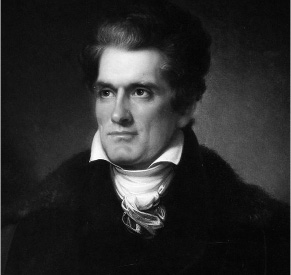America in the 1850sThe Compromise of 1850 |
What happened with the proposal that California enter the Union? |
Three great statesmen of the republic rose in the Senate to deliver remarks on the subject. John C. Calhoun of South Carolina, Henry Clay of Kentucky, and Daniel Webster of Massachusetts were old, but they were the only persons who had the moral and political stature to make powerful statements. Calhoun, who had become much more bitterly opposed to any form of federal intervention, warned the North to leave the South alone. Clay, who had long been seen as the great compromiser in the Congress, asked for his fellows to make one more arrangement. And Daniel Webster, whose constituents had loved him for many years, earned political disfavor in the North by arguing in favor of compromise.

South Carolina Senator John C. Calhoun (1782–1850), a former U.S. vice president under John Quincy Adams and Andrew Jackson, as well as former secretary of war and secretary of state, vehemently opposed the Compromise of 1850.
